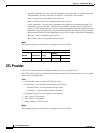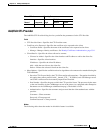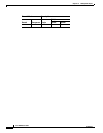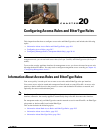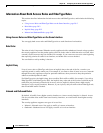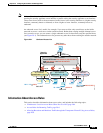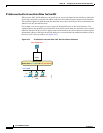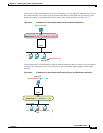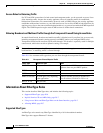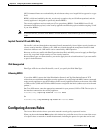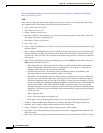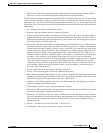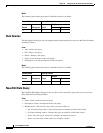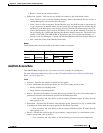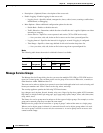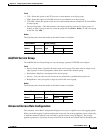
20-6
Cisco ASDM User Guide
OL-16647-01
Chapter 20 Configuring Access Rules and EtherType Rules
Information About Access Rules and EtherType Rules
Access Rules for Returning Traffic
For TCP and UDP connections for both routed and transparent mode, you do not need an access list to
allow returning traffic, because the security appliance allows all returning traffic for established,
bidirectional connections. For connectionless protocols such as ICMP, however, the security appliance
establishes unidirectional sessions, so you either need access lists to allow ICMP in both directions (by
applying access lists to the source and destination interfaces), or you need to enable the ICMP inspection
engine. The ICMP inspection engine treats ICMP sessions as bidirectional connections.
Allowing Broadcast and Multicast Traffic through the Transparent Firewall Using Access Rules
In routed firewall mode, broadcast and multicast traffic is blocked even if you allow it in an access rule,
including unsupported dynamic routing protocols and DHCP (unless you configure DHCP relay).
Transparent firewall mode can allow any IP traffic through. This feature is especially useful in multiple
context mode, which does not allow dynamic routing, for example.
Note Because these special types of traffic are connectionless, you need to apply an extended access list to
both interfaces, so returning traffic is allowed through.
Table 20-1 lists common traffic types that you can allow through the transparent firewall.
Information About EtherType Rules
This section describes EtherType rules, and includes the following topics:
• Supported EtherTypes, page 20-6
• Implicit Permit of IP and ARPs Only, page 20-7
• Using Access Rules and EtherType Rules on the Same Interface, page 20-2
• Allowing MPLS, page 20-7
Supported EtherTypes
An EtherType rule controls any EtherType identified by a 16-bit hexadecimal number.
EtherType rules support Ethernet V2 frames.
Ta b l e 20-1 Transparent Firewall Special Traffic
Traffic Type Protocol or Port Notes
DHCP UDP ports 67 and 68 If you enable the DHCP server, then the security
appliance does not pass DHCP packets.
EIGRP Protocol 88 —
OSPF Protocol 89 —
Multicast streams The UDP ports vary depending
on the application.
Multicast streams are always destined to a
Class
D address (224.0.0.0 to 239.x.x.x).
RIP (v1 or v2) UDP port 520 —



